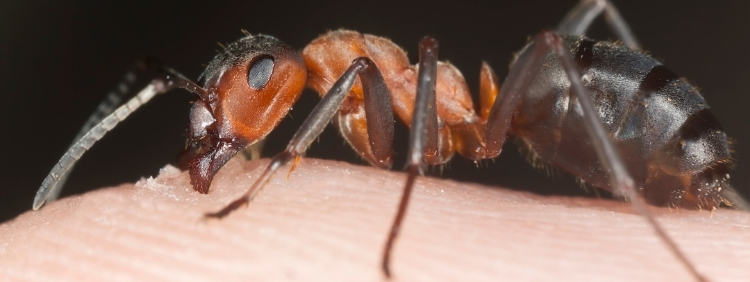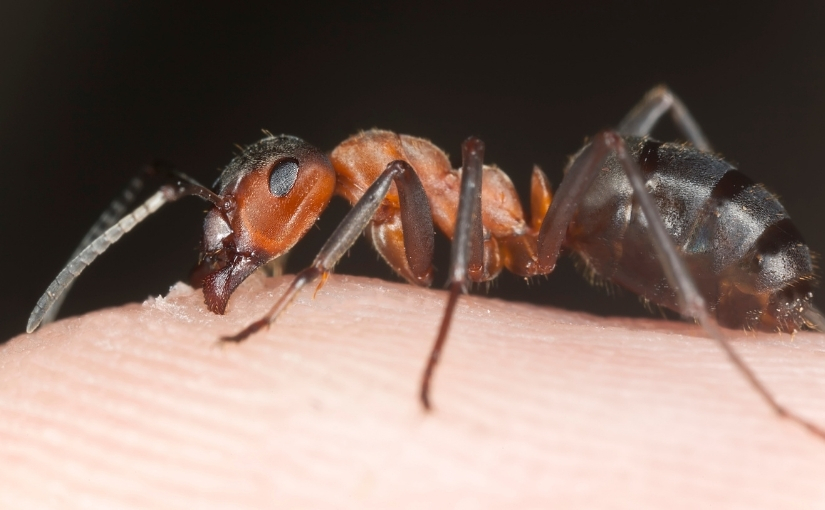
The main reason to call for professional carpenter ant control in Vaughan is because of the risk of severe structural damage to your home. The insects are not known for frequently biting humans, but they do have the capability to do so. While a bite from a carpenter ant is usually not serious, it can be painful. Here is some information about why carpenter ants may bite and what to expect if they do.
Why Might Carpenter Ants Bite?
Carpenter ants are not parasites that feed on blood. Therefore, unlike mosquitos or bed bugs, they don’t actively seek out human beings to bite them. In fact, carpenter ants would prefer not to bite humans at all.
If you have ever seen a carpenter ant up close, you may notice their strong and powerful mandibles. These are usually used for chewing through wood, but if a carpenter ant feels threatened, it can bite in self-defense. Generally speaking, however, you are in no danger of being bitten if you leave a carpenter ant alone and do not try to handle it. Carpenter ants are very protective of their nests. If you disturb it, they may feel threatened. Ants can band together to defend their nests, so even if you stumble onto it by accident, you may be on the receiving end of bites from multiple ants at once.
What Does a Carpenter Ant Bite Feel Like?
Since a carpenter ant’s jaws are strong enough to chew through solid wood, it shouldn’t come as a surprise that they can puncture the skin if the ant bites hard enough. This can be sufficient to draw blood. A carpenter ant bite may feel like a very strong pinch, which is essentially what it is.
If you are bitten by a carpenter ant, you may also experience a burning sensation. When an ant bites, it releases a fluid called formic acid. This irritates the wound, which should slow down a predator long enough for the ant to make its escape. Unlike a fire ant, a carpenter ant does not have a stinger with which to deliver the formic acid. Rather, it has a small opening in its abdomen called an acidopore through which it can spray its venom similar to the way a skunk can aim its abdomen and spray.
Some people are allergic to formic acid and may experience symptoms of severe swelling from exposure. However, a single carpenter ant does not produce enough formic acid to cause any long-term harm. Nevertheless, the irritation it causes may also cause carpenter ant bites to itch. A carpenter ant bite may remain painful and symptomatic for a day or two, then symptoms should subside. Talk to a doctor if the burning sensation persists for more than a few days.
How Do You Treat a Carpenter Ant Bite?
The site of the bite can develop a blemish about the size of a pea. If the bite is bleeding, you should apply an antibiotic ointment to guard against infection. If it is burning, you should wash it as soon as possible using water and soap. This helps to decrease the discomfort by flushing away the formic acid from the wound. If the pain and burning sensation persist, you can apply ice or a cold compress to the site to soothe the symptoms by numbing the skin.
Once the bite wound is clean, you might want to cover it with a bandage, especially if it is itchy. This can protect the wound from bacteria that could cause infection.
Contact Truly Nolen for Carpenter Ant Control in Vaughan
Carpenter ant bites can be a minor irritation, but the damage to your home can be a major catastrophe. Truly Nolen can determine the extent of the infestation and not only remove the nest but treat your home so pests don’t come back. Find out more about the pest control services we offer.
